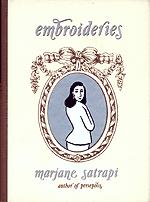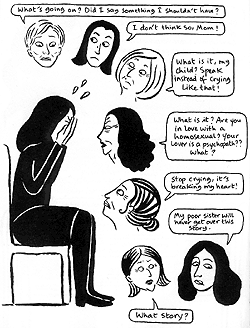
|
"Embroideries" depicts Satrapi and a klatch of her female friends and relatives engaged in an after-dinner bull session. The men, naturally, have all gone off to take a nap while the women clean up and settle down to tea. The place is Iran and the time is 1991, when Satrapi was 20. The dominant character is the grandmother, who Satrapi depicts as a highly independent, worldly woman who goes from bad-tempered ogre to mild and caring "grandma" only after having her morning tea with a bit of opium mixed in. After the dishes are done, she presides over more tea as the women exchange juicy gossip and confession in a process best described by the grandmother. "Speaking behind other's backs ventilates the heart." Briefly liberated from the constraints of their male-dominated culture the women speak freely and frankly of love, sex and relationships in the context of a defiantly traditional culture lurching into the 21st century.
Chiefly the ladies have Man Trouble, a subject most women will relate to and most men will find chilling in its bluntness. The ladies exchange one fascinating horror story after another of deadbeats, cheaters, grifters, psychopaths and dirty old men. While these woeful tales will elicit international sympathy, western readers will find some of the problems unfamiliar. Cultural institutions such as arranged marriages, even for girls of 13, and the premium on female virginity only add to the women's problems. In one shocking discussion, the women debate the merits of "embroidery," the Iranian euphemism for suturing the vaginal opening to "restore" virginity. Bringing us such glimpses of an unfamiliar world continues to be the hallmark of Satrapi's work.
 The women of "Embroideries" console a distraught member in Marjane Satrapi's new graphic novel
The women of "Embroideries" console a distraught member in Marjane Satrapi's new graphic novel |
She also excels at recreating vibrant characters and situations out of what would be hazy memories for most other people. The narrative bounces easily from the women in the room to flashbacks illustrating their tales of woe, and back again to the present as others add critical commentary. The older generation, surprisingly, comes across as the most liberated. One "Auntie" argues persuasively for taking a married lover, explaining that, "...his bad breath, his hemorrhoid attacks, his flues," etc. are all for the wife while for the mistress, "he's always bleached and ironed, his teeth sparkle, his breath is like perfume," etc. Another older woman discusses the surgery that took fat from her rear and applied it to her bosom the better to keep her husband's attention. "Of course," she says, "this idiot doesn't know that every time he kisses my breasts, it's actually my ass he's kissing."
What emerges over the course of this slim novella is a sort of chamber work on the way women talk to each other and experience their place in the world. Satrapi reflects the way the conversations dovetail with each by having the images do the same. Eschewing panels altogether, most pages contain only two or three images or one full-page image, removing the rigid linearity of a grid layout. Even with the greater amount of space this affords her, Satrapi sticks with the simple illustrative style of her previous works. Clearly something of a "make-do" cartoonist, her artwork nevertheless has enough personality to be instantly recognizable.
With "Embroideries" Marjane Satrapi has created a great "woman's" comic, and I mean that without the slightest hint of derision. It focuses exclusively on female characters, examining the way they talk and the aspects of their lives unique to their sex, and then presents their stories in a way that reflects the ebb and flow of women's talk. Yet, unlike what would be labeled a "men's comic," it feels inclusive rather than alienating. "Embroideries" is as funny, opinionated, controversial and surprising as any good comic or conversation should be.
